Street photographers often shy away from making portraits because they don’t want to impose on people. Creating remarkable street photography portraits isn’t as scary as you may think. By making a stranger’s portrait you may also make their day.
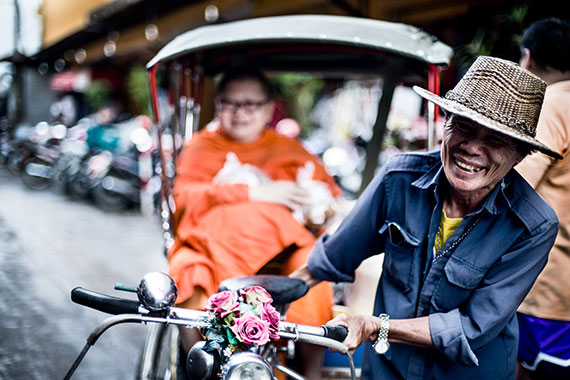
Be confident in yourself. Know your camera intimately. These are two of the most important aspects of becoming a successful photographer. No matter what you choose to photograph. Having a strong belief in what you do is far more important than having the latest camera equipment. Knowing how to use the camera in your hands is far more important.
A balance between having a solid intention and a plan will help you capture more impressive images. Know the type of portraits you want to create and go out and make them. Study what it takes to make this happen and be consistent about how you do it.
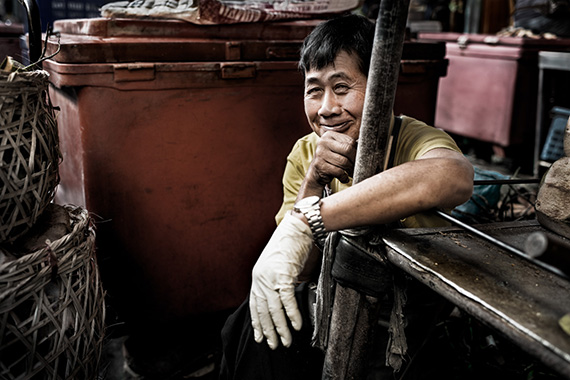
Know Your Camera and Focus on Your Subject
Don’t just focus your lens on your subject, give them your attention. It’s one thing to be able to create nice, sharp portraits, but unless you’re truly concentrating on your subject you will often miss your mark.
Have an intimate relationship with your camera. Know the settings you most need to use intuitively and forget about the rest. This happens with frequent use. Picking up your camera every day and taking a few photos will help you grow in familiarity with it. You will also become more confident.
Study your camera. Understand how it works and what you can achieve with it. Don’t be wowed or distracted by all the extras, but do know how to focus it and set the exposure well. Once you’ve got these two things down, you’re well on your way to creating more interesting photographs.
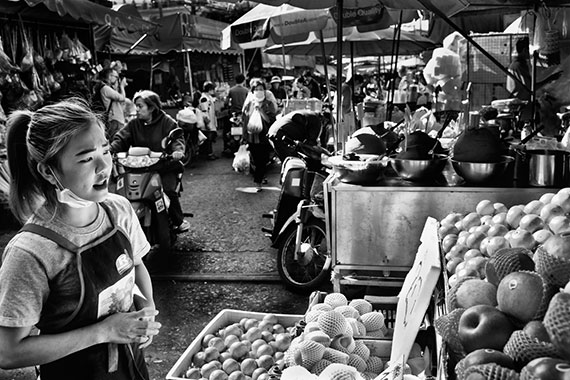
When you come to make a portrait of someone, be ready to give them your attention. Don’t have your head down fiddling with your camera. This is not going to help your subject have confidence in what you’re doing.
Before you approach someone, get your settings right, or as close as possible. Check your exposure settings before the person is even aware of you. If you use manual mode, take a light reading from your subject using your spot meter and make the necessary adjustments. Using an auto mode, make sure the camera will set the exposure for your subject.
Beware of bright light behind your subject. This is the most common occurrence that will throw your exposure off. Compensate so the camera will record good detail in the person’s face and not be influenced by the bright backlighting.
If you can, preset your focus by using manual focus or holding down the focus lock button. This may not be completely accurate if you’re not in position. At least you will be in close proximity to the right distance when you approach your subject.

I photographed this porter in a local market. I saw him leaning on his hand truck from my position across the street. I figured he may let me take his photo if I asked. I wanted to get in close, as I only had my 35mm prime lens and wanted to show the traditional tattoos on his arms. I also thought I may not have much time when I approached him.
I made a spot meter reading from his face and took a test exposure without him being aware of me. I also set my focus roughly to the distance I thought I would be from him.
Approaching him, with my camera plainly visible, I asked if I could take his picture. He agreed, but at the same time dropped his arms down by his side. As I indicated to him I would like him to stand as he had been, a few of the market vendors nearby started to tease him and tell him to smile.
I managed just one frame before he became uncomfortable with the attention and pushed his hand truck away. My camera settings were correct and the one photograph I captured was in focus and well exposed. The next time I saw him I had a print of the picture to give him. He always smiles and says hi to me each time I’m back at the market.
Knowing your camera well will enable you to be more focused on your subject. Had I approached him and spent the precious moments setting my camera, I would not have been so successful with my portrait.
Anticipate the Action
Thinking ahead to what may happen when you approach your subject is important. If you’re prepared in your mind you’re less likely to be taken by surprise.
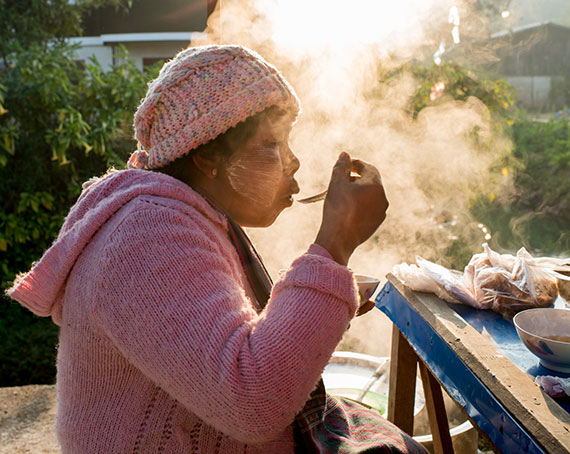
Not everything will go as planned every time, but you may be surprised at how often it does. Work on anticipating the action and build this skill.
Capturing a remarkable street portrait requires a certain amount of planning and often a good dose of luck. Without planning, the luck doesn’t happen so frequently.
Particularly for candid street portraits being able to anticipate the action will result in a higher success rate. Look at these things:
- Lighting
- Background
- Distracting elements
- Movement
Is your target subject in good lighting? This will make or break your portrait. If the light is not so good, can you somehow compensate for it?
Do you need to move to avoid a very bright or distracting background? Strong light behind your subject can be challenging to deal with. If it’s what you prefer, then be careful to set your exposure well.
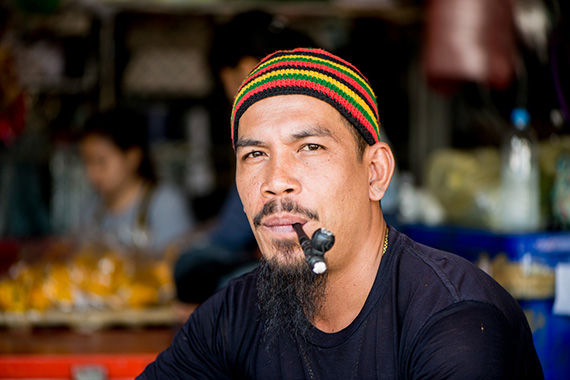
Distracting elements in your composition will detract from your subject. Make sure that you fill your frame only with what’s relevant or come in tight so you are only photographing your subject.
Will people or passing traffic interrupt your photo by moving into your frame? Time your photos well to avoid these things.
Candid or Posed?
Many photographers prefer a candid approach to street photography. This avoids interacting with their subject. Fear of imposing is the most common reason my workshop participants have for not photographing people.
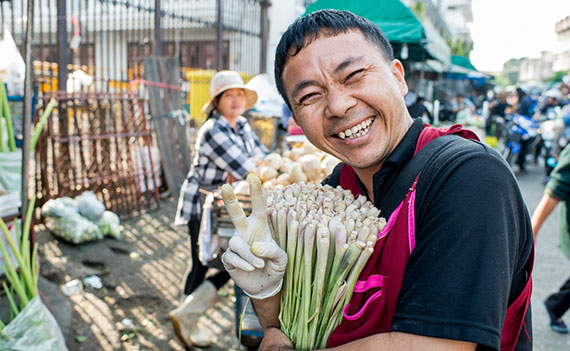
Learn to be bold. Don’t be pushy or abrasive, but pleasantly approach people and ask if you can photograph them. Be prepared for a little friendly interaction when you do. You will be surprised at how often people will feel blessed by the attention you’re giving them.
Spend a little time chatting and putting them at ease. Explain what you’re doing and why you want to take their photo. Having a photography project you are working on and can tell them about will often raise their interest and put them at ease.
Engaging with your subject in this way will often produce a portrait with more feeling than candid portraits do. Don’t be shy; be confident. It will be difficult and even a bit scary at first, especially if you’re naturally introverted. I am, but I love making connections with the people I photograph in the streets.
When I see someone engrossed in what they’re doing, I often prefer to make candid portraits, though. Their concentration can make a more interesting portrait than if they’re posing uncomfortably.
Practice Your Style Consistently
Going out once and plucking up the courage to approach strangers in the street to make their portraits will rarely build lasting success. The first time you do you will probably fail. Don’t give up. Try again and refine your methods.

You will learn to read people and perceive who will enjoy being photographed and who will refuse you. This is not a science. At times you will get it wrong and be met with rejection. The more you practice approaching people the easier it will become and the more remarkable street portraits you will be able to take.
About the Author
Kevin Landwer-Johan is a professional photographer, photography teacher, and filmmaker with over 30 years of experience. Originally from New Zealand, he has made his home in northern Thailand since 2002. His passions are people and documentary photography.
Go to full article: Street Portrait Photography Tips
What are your thoughts on this article? Join the discussion on Facebook
PictureCorrect subscribers can also learn more today with our #1 bestseller: The Photography Tutorial eBook
The post Street Portrait Photography Tips appeared first on PictureCorrect.